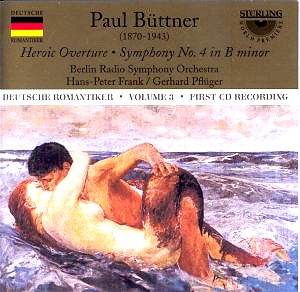Paul Büttner was born in Dresden on 10 December
1870. Information on him is not easy to come by. I have not checked
the current or even the 1980 Grove but Grove V had nothing on him at
all. The extensive notes compiled for this release by the redoubtable
Per Skans (usually associated with Olympia, especially their incomparable
Miaskovsky series, and Bis) function as a very generous alternative
reference.
Checking my old and admirable ‘A Dictionary of Modern
Music and Musicians’ (J.M. Dent 1924) I can supplement what Mr Skans
has written. Büttner was a pupil of Draeseke in Dresden. He taught
there between 1896 and 1907. He was also active as a music critic in
Dresden. The Munich-based, Alfred Einstein’s entry in the dictionary
says: ‘as a symphonist, has been somewhat influenced by Anton Bruckner.’
The entry lists four symphonies but does not give dates for them. They
are No. 1 in F (1899); No. 2 in G; No. 3 in D flat major (said by Herr
Einstein to his best-known work … at least in 1924) and No. 4 in B minor.
There are various symphonic phantasies, an overture to Napoleon’s
Tomb, Saturnalia for drums and wind instruments, a violin
sonata, a string quartet in G minor, male choruses and two operas: Anka
and Das Wunder der Isis.
As a staunchly anti-Nazi Social Democrat he was driven
from his post of artistic director of the Dresden Conservatoire in 1933
and survived giving private music tuition and taking refuge in composition.
After the end of the war his name was given fitful life by the conductors
Joseph Keilberth, Heinz Bongartz and Kurt Masur. His works are published
by Edition Peters in Leipzig.
The present recordings despite being declared on the
insert as DDD date from 1974 and 1965 and must accordingly be ADD. They
sound perfectly respectable, not especially refined. They have a rugged
ferocity that complements both pieces. The Heroic Overture (premiered
in 1927) is not short of gallopingly energetic music redolent at one
moment of Brahms’ Fourth Symphony, at another of Schumann and at another
of Mendelssohn though always rather brooding. Its peroration - a grand
gesture, half groan, half blare, impresses. It does not convince structurally
tending to ramble but its incidents are often of commanding dramatic
moment and the soloistic use of the brass is cleverly brought off.
The Fourth Symphony (a work largely written during
the Great War) is in four movements. This is no time-serving performance.
Although the grip does slacken in the last two movements overall this
is a recording that has me wondering whether this was just a good day
for Pflüger or whether we have a seriously neglected conductor
here. The playing and sense of engagement is palpable, fiery with the
sort of torrential conviction we find in Carlos Kleiber’s Beethoven
5 or Mravinsky’s Sibelius 7. The orchestra was in much superior form
in 1965 than in 1974. As one illustration try the final fine satin tone
of the violins from 12.00 to the close of the first movement, the Straussian
yearning of the second movement. Hiss is thankfully left intact is a
minuscule and forgettable ‘price’ to pay.
The four movements run the gamut: flourishing confidence
and panache (3.18 I), Elgarian sweep (9.02 I), bubbling, brooding, deep
Brucknerian string-writing, dense sombre hymnal rising to raucous brassy
climaxes decaying away into nobility (III), sweetly mysterious harp
writing (8.22 III) and ending with Brucknerian storm-clouds and a joyous
desperation. The second movement is like a cross between Beethoven 7
and Berlioz’s Symphonie Fantastique: a witches Sabbat.
Büttner was, on this evidence, a composer in the
Bruckner-Schumann vein rather like Wetz but with a fantastic tendency
fuelled by Berlioz and Richard Strauss. He would I am sure have been
delighted with these recordings. I doubt that he heard a more passionate
performance of the Fourth Symphony during his lifetime. Recommended
to pursuers of the late-romantic trend as it made its way into the twentieth
century.
Rob Barnett
EARLIER VOLUMES IN THE STERLING DEUTSCHER ROMANTIKER SERIES
Richard WETZ Symphony No. 3
Berlin SO/Erich Peter
STERLING CDS-1041-2
Norbert BURGMÜLLER Symphony No. 1
Hugo STAEHLE Symphony No. 1
Orchester der Staatstheater Kassel/Marc Piollet
STERLING CDS-1046-2
Full details: www.sterlingcd.com


